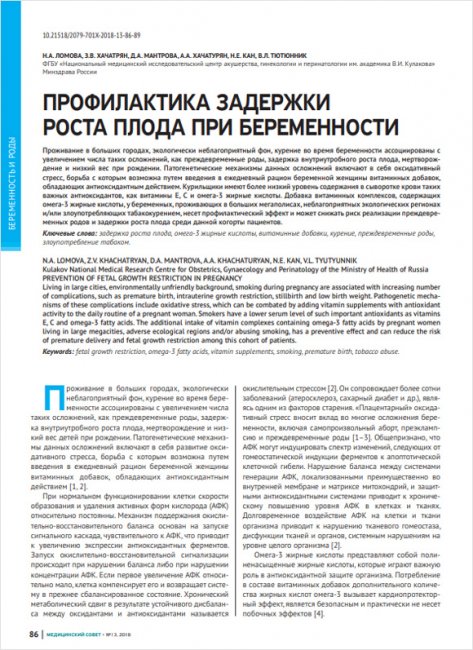Журнал "Медицинский совет. Акушерство и гинекология" №13, 2018
Н.А. Ломова, З.В. Хачатрян, Д.А. Мантрова, А. А. Хачатурян, Н.Е. Кан, В.Л. Тютюнник, ФГБУ «Национальный медицинский исследовательский центр акушерства, гинекологии и перинатологии им. академика В.И. Кулакова» Минздрава России
Проживание в больших городах, экологически неблагоприятный фон, курение во время беременности ассоциированы с увеличением числа таких осложнений, как преждевременные роды, задержка внутриутробного роста плода, мертворождение и низкий вес при рождении. Патогенетические механизмы данных осложнений включают в себя оксидативный стресс, борьба с которым возможна путем введения в ежедневный рацион беременной женщины витаминных добавок, обладающих антиоксидантным действием. Курильщики имеют более низкий уровень содержания в сыворотке крови таких важных антиоксидантов, как витамины Е, С и омега-3 жирные кислоты. Добавка витаминных комплексов, содержащих омега-3 жирные кислоты, у беременных, проживающих в больших мегаполисах, неблагоприятных экологических регионах и/или злоупотребляющих табакокурением, несет профилактический эффект и может снижать риск реализации преждевременных родов и задержки роста плода среди данной когорты пациентов.
Prevention of fetal growth restriction in pregnancy
N.A. Lomova, Z.V. Khachatryan, D.A. Mantrova, А.А. Khachaturyan, N.E. Kan, V.L. Tyutyunnik, Kulakov National Medical Research Centre for Obstetrics, Gynaecology and Perinatology of the Ministry of Health of Russia
Living in large cities, environmentally unfriendly background, smoking during pregnancy are associated with increasing number of complications, such as premature birth, intrauterine growth restriction, stillbirth and low birth weight. Pathogenetic mechanisms of these complications include oxidative stress, which can be combated by adding vitamin supplements with antioxidant activity to the daily routine of a pregnant woman. Smokers have a lower serum level of such important antioxidants as vitamins E, C and omega-3 fatty acids. The additional intake of vitamin complexes containing omega-3 fatty acids by pregnant women living in large megacities, adverse ecological regions and/or abusing smoking, has a preventive effect and can reduce the risk of premature delivery and fetal growth restriction among this cohort of patients.
Загрузить файл
Список литературы
1. Казанцева Е.В., Долгушина Н.В., Донников А.Е., Беднягин Л.А., Баранова Е.Е., Терешков П.П. Влияние пренатальной экспозиции бензапирена, стирола и формальдегида на массу тела при рождении в зависимости от полиморфизмов генов системы детоксикации. Акушерство и гинекологи, 2016, 7: 68-78.
2. Высоких М.Ю., Тютюнник В.Л., Кан Н.Е., Курчакова Т.А., Суханова Ю.А., Володина М.А., Тарасова Н.В., Цвиркун Д.В., Меджидова М.К., Арушанова А.Г. Диагностическая значимость определения содержания малонового диальдегида и активности каталазы при преждевременных родах. Акушерство и гинекология, 2017, 4: 62-67.
3. Curtin SC, Matthews TJ. Smoking Prevalence and Cessation Before and During Pregnancy: Data From the Birth Certificate, 2014. Natl Vital Stat Rep, 2016, 65: 1-14.
4. Громова О.А., Торшин И.Ю., Лиманова О.А., Серов В.Н. О профилактической, лечебной и избыточной дозе омега-3 полиненасыщенных жирных кислот в прегравидарный период, во время беременности и кормления грудью. Эффективная фармакотерапия. Акушерство и гинекология, 2014, 4(45): 28-36.
5. Saccone G, Berghella V. Omega-3 supplementation to prevent recurrent preterm birth: a systematic review and metaanalysis of randomized controlled trials. Am J Obstet Gynecol, 2015, 213: 135-40.
6. Kar S, Wong M, Rogozinska E, Thangaratinam S. Effects of omega-3 fatty acids in prevention of early preterm delivery: a systematic review and meta-analysis of randomized studies. Eur J Obstet Gynecol Reprod Biol, 2016, 198: 40-6.
7. Rabinovitz S. Effects of omega-3 fatty acids on tobacco craving in cigarette smokers: A double blind, randomized, placebo-controlled pilot study. J Psychopharmacol, 2014, 28: 804-9.
8. Harper M, Thom E, Klebanoff MA, et al. Omega3 fatty acid supplementation to prevent recurrent preterm birth: a randomized controlled trial. Obstet Gynecol, 2010, 115: 234-42.
9. Freeman MP, Cohen LS, Mcinerney K. Omega-3 Fatty acids and gestational length in a high-risk psychiatric population due to psychiatric morbidity and medication exposure during pregnancy. J Clin Psychopharmacol, 2014, 34: 627-32.
10. Saccone G, Berghella V. Omega-3 long chain polyunsaturated fatty acids to prevent preterm birth: a systematic review and meta-analysis. Obstet Gynecol, 2015, 125: 663-72.
11. Imhoff-Kunsch B, Briggs V, Goldenberg T, Ramakrishnan U. Effect of n-3 long-chain polyunsaturated fatty acid intake during pregnancy on maternal, infant, and child health outcomes: a systematic review. Paediatr Perinat Epidemiol, 2012, 26(Suppl 1): 91-107.
12. Salvig JD, Lamont RF. Evidence regarding an effect of marine n-3 fatty acids on preterm birth: a systematic review and meta-analysis. Acta Obstet Gynecol Scand, 2011, 90: 825-38.
13. Abramovici A, Gandley RE, Clifton RG, et al. Prenatal vitamin C and E supplementation in smokers is associated with reduced placental abruption and preterm birth: a secondary analysis. Bjog, 2015, 122: 1740-7.




 1
1 2
2 3
3 4
4


Комментарии (0)